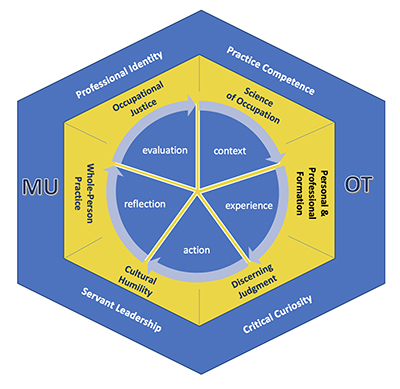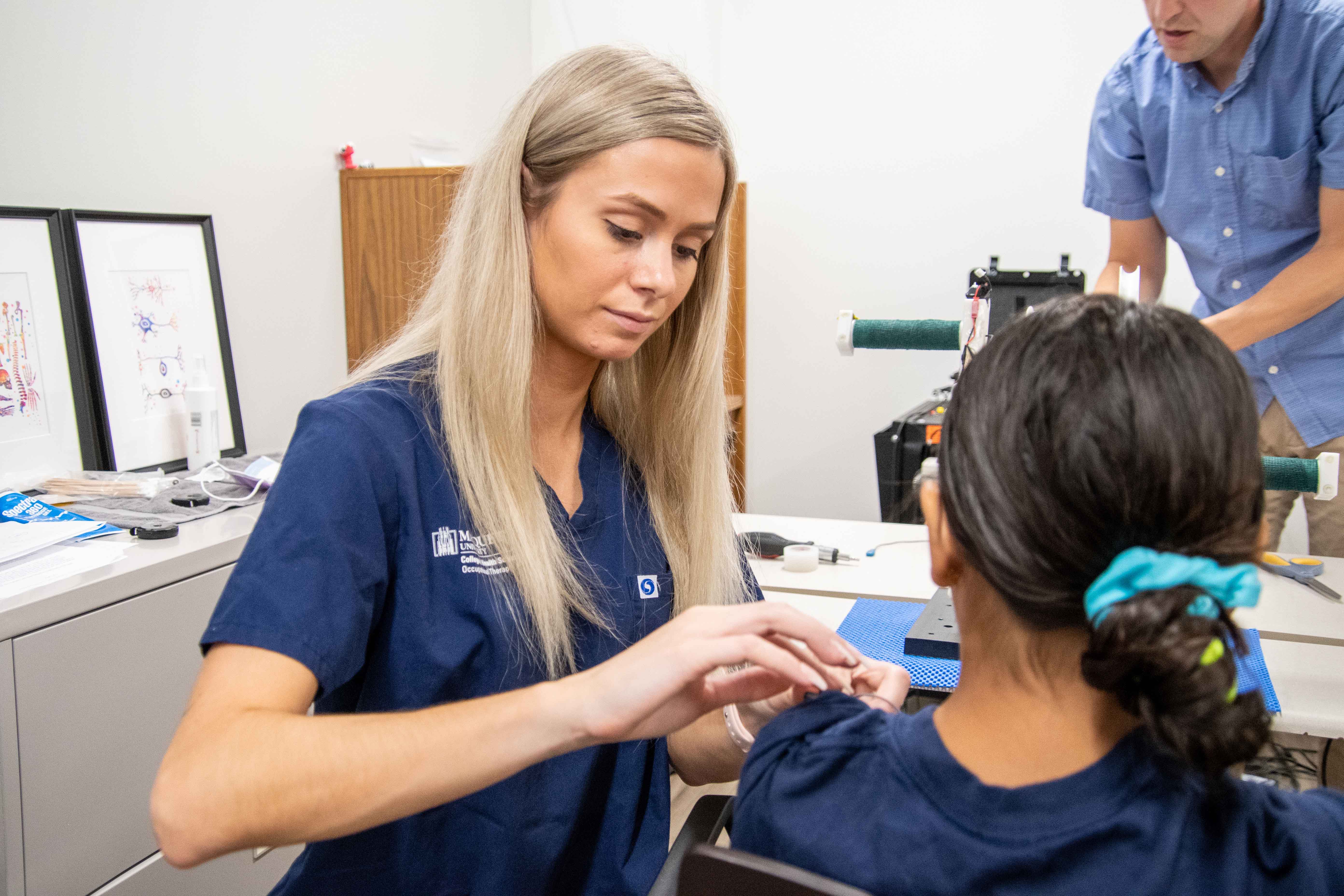Philosophy of Education
The goal of Jesuit education is formation of the Habit of Discerning. The primary educational goal of Marquette University is “to graduate students who are transformed by their education, and who will transform the world in which they live.” In essence, forming graduates for whom discernment (or good decision-making) is a habit, is both transforming for the student, and transformational for and with others. In Catholic, Jesuit identity, formation and transformation is operationalized through the Ignatian Pedagogical Paradigm (IPP), which is considered both a philosophy or learning and an educational process. The Department of Occupational Therapy endorses the IPP as an ideal framework for both teaching and learning in occupational therapy education, as the very academic nature of a Jesuit education is the presentation of content from a human-centered approach.
Curriculum Overview
The OTD curriculum design acknowledges the Jesuit values of cura personalis (care for the whole person) and magis (more; for the greater glory of God) that is, commitment to the “greater good,” all to fulfill the Marquette mission in educating ethical and informed leaders, who are also boldly ambitious.

The curriculum includes inclusive didactic and real-world experiential learning opportunities that ready practitioners for practice as a generalist at minimum, through the inclusion of academic and experiential learning, while also affording students the opportunity to explore areas of interest. Students are exposed to both current and emerging practice settings and areas of practice in preparation for work with a variety of persons across the lifespan.
OTD Program Learning Outcomes
Practice Competence
- Achieve entry-level competence through a combination of didactic, fieldwork and capstone educational components.
- Integrate the Occupational Therapy Practice Framework Domain and Process, theoretical constructs and the evidence base to inform, plan and implement safe, client-centered and occupation-based interventions for persons, groups, populations.
- Articulate a theoretical foundation for capstone proposal; acquire, critique, review and synthesize the breadth of the literature to support research and/or scholarship in the area(s) of clinical practice skills, research skills, administration, leadership, program and policy development, advocacy, education or theory development; disseminate knowledge in written and oral formats.
Professional Identity
- Relate whole-person practice to the roles and responsibilities of the occupational therapist through the integration of interprofessional perspectives on caring for the person who is the patient, with particular focus on the patient and provider as persons situated in contexts that shape their knowledge, behaviors and attitudes about health and well-being.
- Explicate the influence of interprofessional and intraprofessional collaborative practice on healthcare outcomes including the patient experience of care, cost of care, health of populations and the clinician experience.
- Collect, source, and synthesize knowledge about humans as occupational beings including person, occupation, environment and contextual factors that influence occupational performance and apply knowledge to inform action in the varied roles of the occupational therapist including direct care provider, consultant, educator, manager, leader, researcher and advocate.
- Perform consistent self-assessment to identify and determine strengths and areas of improvement in clinical performance and in professional behaviors; demonstrate the ability to improve skills based on feedback and the process of self-reflection.
Critical Curiosity
- Apply awareness of cultural and human differences in the selection and critical appraisal of the evidence base to guide and inform occupational therapy process for persons, groups and populations in a variety of practice contexts and environments.
- Synthesize theory and professional reasoning (scientific, diagnos tic, procedural, narrative, pragmatic, ethical) to inform the selection of ethical action in response to occupational performance needs of persons, groups, populations.
Servant Leadership
- Collect, source, and synthesize knowledge about humans as occupational beings including person, occupation, environment and contextual factors that influence occupational performance and apply knowledge to inform action in the varied roles of the occupational therapist including direct care provider, consultant, educator, manager, leader, researcher and advocate.
- Promote the connection between occupational performance and health and wellness by evaluating occupational opportunities in local community systems; take action to address occupational disparities for persons, groups, or populations by advocating for equitable access to occupational engagement for clients who are experiencing occupational imbalance, alienation, marginalization or deprivation.
Curricular Threads
The curriculum is also constructed around six curricular threads: Occupational Justice, Science of Occupation, Personal and Professional Formation, Cultural Humility, Discerning Judgement and Whole-Person Practice. These curricular threads connect course concepts concurrently, from semester to semester, as students progress through the 3-year course of study. These threads tie the Marquette-specific foundational knowledge to the development of skills, attitudes and abilities of ethical, visionary and autonomous decision-makers who are committed to the lifelong pursuit of competence and conscience.
Curriculum Grid
Graduation Requirements:
College of Health Sciences Health Professional Students
Students are required to graduate at the end of the term in which all degree requirements are completed. Degree requirements are those university and college requirements needed to earn the degree. Normally, Health Science Professional students must meet the graduation requirements which are stated in the Health Science Professional Bulletin issued for the year in which they entered the professional phase of their program at Marquette. Substitutions or waivers for specific courses required for degree completion may occur, as determined by the college. It is to be expected that these course exceptions can occur in the case of students whose enrollment period extends for more than eight years. Students whose enrollment is interrupted for two or more consecutive terms normally must meet the requirements in the bulletin issued for the year in which they return to the university. The college may determine that readmitted students fall under a different set of degree requirements than the academic year in which they are readmitted. Students are responsible for keeping themselves informed of the requirements which apply in their particular cases. Students have available faculty advisers who assist in planning and implementing the students' plans of studies; however, it is ultimately the responsibility of students to know and fulfill the requirements for graduation specified for the selected plan. Candidates for a professional degree must meet the following graduation requirements:
- Health Sciences Professional Requirements:
- Student must attend any course of lectures, or any other exercises which have been or may be required, even though such courses receive no recognition in terms of credit hours.
- Students' records must be cleared of all grades that are not permanent, i.e., grades of I, IC, IE and NG.
- Students must file a formal application for a degree by the deadline published in the Academic Calendar; however, because students are required to graduate at the end of the term in which all degree requirements are complete, the university reserves the right to graduate students without a graduation application on file.
- Commencement is held in May, after the spring term. Participation in commencement does not mean students have graduated. See the Commencement Policyin this bulletin for further details.
- All exceptions to this Graduation Requirements policy must be approved by the Office of the Provost, except:
- the course and bulletin year exceptions listed in paragraph 1 (as approved by the college)
- number 2 (as approved by the college)
Department of Occupational Therapy
Alongside Health Sciences Professional requirements for graduation, graduation from the entry-level OTD program is predicated on student fulfillment of satisfactory grade point average, professional conduct, successful completion of Fieldwork and successful completion of the 2-part Doctoral Capstone. Specific graduation requirements include:
- Successful completion of all didactic and Level I Fieldwork course credits before progression to Level II Fieldwork.
- Successful completion of the minimum 24-weeks, full-time Level II Fieldwork (A and B).
- Successful completion of all coursework and Level II Fieldwork, and completion of preparatory activities (as defined by ACOTE standard D.1.3) before progression to the 14-week Doctoral Capstone Experience.
- Successful completion of the 2-part Doctoral Capstone (capstone project and capstone experience).
Students are allowed a maximum of 3 total attempts to complete Level II Fieldwork. Students have a maximum time frame of 5 years from date of matriculation to complete the didactic, fieldwork, and doctoral experiential components of the program.
Note: OTD courses are sequential and offered once a year. The sequence of courses is fixed, and all classes must be passed (C or above, S, or P) in a semester in order to progress to the next semester. All required coursework must be completed within 5 years of matriculation.



